Category Archives: AOA News Letter
WAFAQI MOHTASIB (FEDERAL OMBUDSMAN) INAUGURATES NEW OFFICE BUILDING IN MULTAN.

- WAFAQI MOHTASIB (FEDERAL OMBUDSMAN)INAUGURATES NEW OFFICE BUILDING IN MULTAN
- RESOLVES TO DELIVER ADMINISTRATIVE JUSTICE AT THE DOORSTEPS OF THE PEOPLE
- OFFICIALS AVOIDING IMPLEMENTATION OF DECISIONS WILL BE PROCEEDED AGAINST
Multan: 26 June, 2025 – The Wafaqi Mohtasib (Federal Ombudsman), Mr. Ejaz Ahmad Qureshi has called upon the government officials to ensure implementation of the Wafaqi Mohtasib’s decisions with a view to providing prompt relief to the people.
He was addressing government officials and officers of the Wafaqi Mohtasib Regional Offices following inauguration of the new building of Regional Office at Multan today.
He said that the Wafaqi Mohtasib’s office is fundamentally a poor man’s court committed to providing administrative relief to the poor and moralized segments of the society. “We hear complaints against more than 200 Federal Government entities and redress the public complaints against maladministration as expeditiously as possible”, he observed.
Later, he held a meeting with the senior officials of the Regional Offices at Multan, Bahawalpur and DG Khan alongwith the representatives of the Federal Agencies there. He urged them to redouble their efforts for serving the people and ensure implementation of his decisions in letter and spirit. He also made it clear that his decisions have to be implemented otherwise he would be invoking provisions in the law prescribed for non-implementation as punishment. “The Wafaqi Mohtasib possesses powers equivalent to those provided to the judges of the Supreme Court”, he added.
Addressing the meeting, he said that the outgoing year 2024, witnessed a record surge in the receipt and disposal of complaints as a result of expanding outreach and accessibility. We have established new offices at Muzaffarabad (AJ&K), GB, Mirpur Khas, Sahiwal and DG Khan during the last couple of months and now this intuition has presence in 26 cities of the country.
The Wafaqi Mohtasib further added that the outgoing year 2024 was very eventful in the sense that it witnessed resolution of 223,198 complaints, out of the 226,372 it received, which brings about the implementation rate to a record 93.21%. Furthermore, 126 Khuli Katcheries were held across the country to deliver justice at the doorsteps of the people, in addition to 171 visits undertaken in pursuance of the OCR Programme. Additionally, 79 Inspection Visits were undertaken to those government offices and agencies generating large number of complaints to fix their systemic issues. “The increasing number of public complaints is a testament to the viability and efficacy of this institution in resolving public complaints. It also initiated significant measures ameliorating the lot of Overseas Pakistanis and Children, he maintained.
The inaugural ceremony was attended by a large number of people belonging to the civil society and media besides the government officials and the general public.
QUADRILATERAL INSTITUTIONS LAUNCH LEADERSHIP TRAINING IN MANUFAHI TO PROMOTE GOOD GOVERNANCE AND PREVENT CORRUPTION.
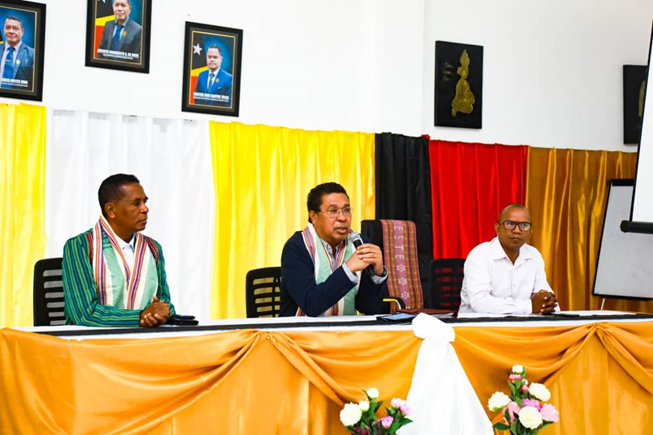
Manufahi, 06 May 2025 – The Office of the Ombudsman for Human Rights and Justice (PDHJ), in partnership with the Anti-Corruption Commission (CAC), the Public Service Commission (CFP), and the Inspector General of the State (IGE), officially launched a leadership training program for public officials in Manufahi Municipality. The training is part of the Quadrilateral Initiative — a joint effort to prevent and combat corruption, promote good governance, and protect human rights in public administration.
In his opening remarks, the Ombudsman for Human Rights and Justice reminded participants of the vital role of public service. Quoting Samora Machel, he said, “Public servants are servants of the people,” emphasizing that serving the public requires prioritizing duty over personal benefit. “To be a good servant, one must sacrifice first and seek benefit later perform your duty before claiming your rights,” he added.
He also drew inspiration from Pope Francis, stating, “Those who do not live to serve, do not serve to live.” He encouraged all civil servants to see their roles not merely as jobs, but as part of a larger social mission to serve the people and the nation.
The training is designed to build leadership capacity among public officials and remind them of their ethical responsibilities. “Sometimes we get caught up in routines, working Monday to Friday, and forget the values that should guide us. This training is a space to reflect on our mission, we are not here just to earn a salary, but to uphold the public interest and promote justice,” the Ombudsman said.
He stressed that good governance and transparency are essential to public service and that leaders must communicate effectively with their teams. He encouraged directors to apply rules fairly and consider the circumstances of employees such as when they are late due to family emergencies or illness before applying sanctions. “Rules are important, but so is fairness. Communication is key in leadership,” he said.
The Ombudsman highlighted that PDHJ is a constitutional body that exists to safeguard citizens’ rights by receiving and investigating complaints against public authorities and institutions. “Our Constitution, in Article 6, outlines the objectives of the State — to protect national sovereignty, guarantee the rights of all citizens, promote democratic values, and ensure popular participation in addressing national challenges like poverty.”
He expressed appreciation for the creation of institutions like PDHJ, CAC, CFP, and IGE, which play a critical role in upholding integrity in public administration. “Our politicians made the right decision to establish these bodies. Together, we ensure that government decisions and public policies truly serve the people.”
He closed his remarks by reminding officials that success in public administration depends on teamwork and communication. “We do not succeed alone. Even those who clean our offices contribute to the mission. When communication flows well, we can uphold good governance. If officials act unfairly, citizens have the right to report them. Complaints can be submitted through our territorial offices, email, or directly to PDHJ’s Investigation Directorate — the law guarantees this.”
The training in Manufahi marks a continued effort under the Quadrilateral Initiative to strengthen ethical leadership, transparency, and accountability across Timor-Leste’s public service.
PUBLIC DEFENDER’S MEETING WITH STUDENTS.
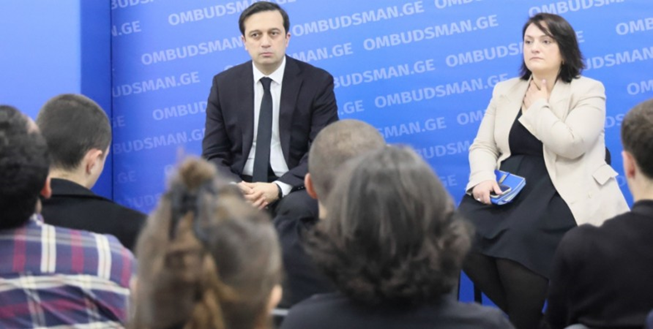
On 13 May 2025, the Public Defender of Georgia, Levan Ioseliani, spoke about the importance of human rights protection and the mandate of the Public Defender’s Office at the meeting with students of Gogita Kiknadze Tbilisi Public School No. 182.
At the interactive meeting, the students showed interest in the state of human rights protection in the country. Among other things, they discussed the current situation in penitentiary institutions, issues of gender equality, the rights of ethnic minorities, and the rights of citizens living in the occupied territories. They also showed interest in the challenges that the Public Defender’s Office faces in the process of carrying out its activities.
The meeting was organized by the Human Rights Education Department of the Public Defender’s Office.
MEMBERS OF THE OMBUDSMAN CLUB AT THE UNIVERSITY OF WORLD ECONOMY AND DIPLOMACY FAMILIARIZED THEMSELVES WITH THE INSTITUTION’S ACTIVITIES.
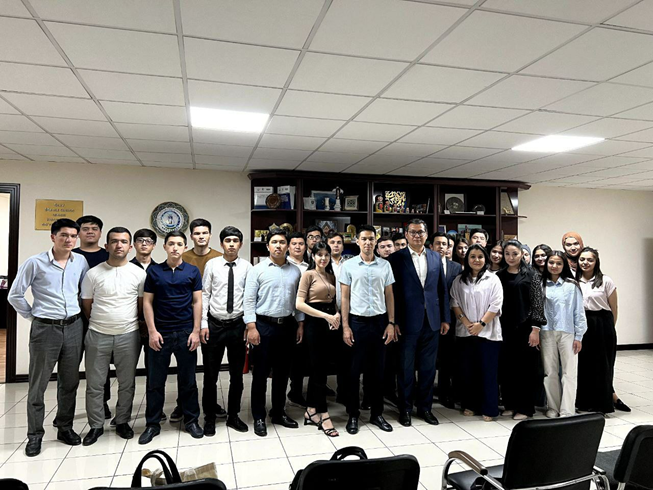
On 7 May 2025, members of the Ombudsman Club — students specializing in International Law at the University of World Economy and Diplomacy (UWED) — visited the Secretariat of the Commissioner of Oliy Majlis for Human Rights (ombudsman).
During the visit, the students received detailed information on the role of the Ombudsman institution in the protection of human rights, the procedure for reviewing citizens’ appeals, as well as mechanisms for public and international cooperation.
They also learned about the Ombudsman’s legislative initiative powers, particularly the ability to propose legal solutions to issues raised in appeals. The discussion further covered the Ombudsman’s participation in parliamentary debates and the authority to provide legal opinions on draft laws.
As part of the Club’s activities, students are offered the opportunity to apply their theoretical knowledge in practice. They may be assigned to relevant departments and sectors of the Secretariat to assist directly in legal analysis, complaint handling, and monitoring activities as apprentices.
At the end of the meeting, the students had the chance to ask questions of interest and gain firsthand insight into the practical aspects of human rights protection.
PDHJ’S 21ST ANNIVERSARY SPOTLIGHTS SYSTEMIC CHALLENGES AND INSTITUTIONAL RECOMMENDATIONS.
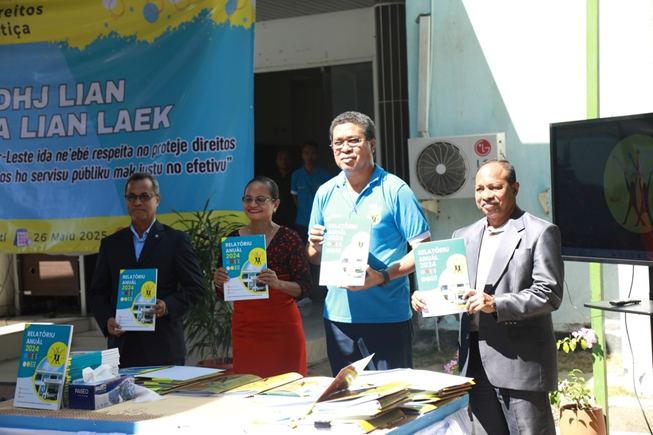
Dili, 26 May 2025 – The Provedoria dos Direitos Humanos e Justiça (PDHJ) celebrated its 21st anniversary with a ceremony held at its national office in Caicoli, where Ombudsman for Human Rights and Justice, Virgílio da Silva Guterres Lamukan, delivered a strong message on the state of human rights and governance in Timor-Leste.
Joined by senior leadership and staff from both national and municipal offices, the Ombudsman used the occasion to present key institutional outputs, including the 2024 Activity Report and several thematic monitoring reports. These included findings on health system performance, particularly shortages of essential medicines, inadequate maternity facilities, and limited human resources in referral hospitals, health centres, and health posts across all 12 municipalities, Ataúro, and RAEOA.
PDHJ also released a report on detention cell monitoring, highlighting continued concerns over poor infrastructure and conditions in municipal police stations and detention posts. Another monitoring report covered the situation in Uma Mahon and social protection centres, revealing gaps in basic services. In addition, the institution submitted 32 final investigation reports, many of which involved serious violations by public officials.
In his address, the Ombudsman stressed that the most frequent and severe violations in 2024 were committed by members of the National Police (PNTL) and teachers. He cited examples of police brutality, including a disturbing case in Manufahi where a young man was injured after a traffic officer forced his ear against a motorcycle exhaust pipe. “This kind of punishment is not lawful. It is degrading and a clear violation of human rights,” said Guterres.
The Ombudsman also expressed alarm over the Ministry of Health’s decision not to renew contracts for nearly 2,000 health workers, which has had a direct impact on service delivery, especially in remote areas. PDHJ monitoring found that some health posts were unable to operate properly due to the lack of staff, medicines, and essential equipment.
In the prison system, the institution observed that some detainees still lacked access to legal assistance and proper healthcare. At Suai Prison, inmates went without hygiene supplies, including soap and toothpaste, for nearly two months, while food deliveries were delayed due to logistical constraints. Although PDHJ found no evidence of torture inside detention cells, it reported that abuse often occurs during arrest and transport, particularly during the use of handcuffs or excessive force.
Guterres acknowledged that some of the shortcomings are linked to limited resources and procurement challenges faced by PNTL. However, he urged the Ministry of Interior and the PNTL General Command to take concrete steps to improve conditions in detention facilities and ensure compliance with human rights standards.
All findings and recommendations will be formally submitted to the National Parliament, the Prime Minister, and key institutions, including the Office of the Attorney General, the Ministries of Justice, Health, Education, and State Administration, as well as MCAE, CAC, the PNTL General Command, and the RAEOA Authority.
“Marking this anniversary is more than a celebration,” said Guterres. “It is a reminder of our duty to protect dignity, demand accountability, and strengthen the foundations of justice in Timor-Leste.”
TRAINING FOR REPRESENTATIVES OF MEDICAL FIELD.

On 28 May 2025, the staff of the Equality Department of the Public Defender’s Office, with the support of the Council of Europe Office in Georgia, conducted training for representatives of several medical institutions, including lawyers and persons responsible for human resources management.
The training aimed to provide information on equality issues to medical institutions in order to further align their activities with the principles of equality and non-discrimination.
The participants were given the opportunity to gain an in-depth understanding of the essence of the right to equality, the scope of anti-discrimination legislation and, in this regard, the mandate of the Public Defender as a national anti-discrimination mechanism. In addition to the theoretical overview, the training focused on covering practical issues tailored to the participants. For this purpose, they received information on discriminatory cases identified directly in the medical field. In addition, since the participants are persons responsible for maintaining legal relations with employees and, at the same time, are employed themselves, attention was also focused on issues of discrimination and sexual harassment in the workplace.
Similar activities aimed at raising awareness are particularly important for improving the situation of equality in the country. The Public Defender hopes that even more representatives of various fields will be willing to deepen their knowledge on equality issues and contribute to the prevention of discrimination.
LEGAL AWARENESS OF THE POPULATION DISCUSSED AT A NATIONAL ROUNDTABLE.
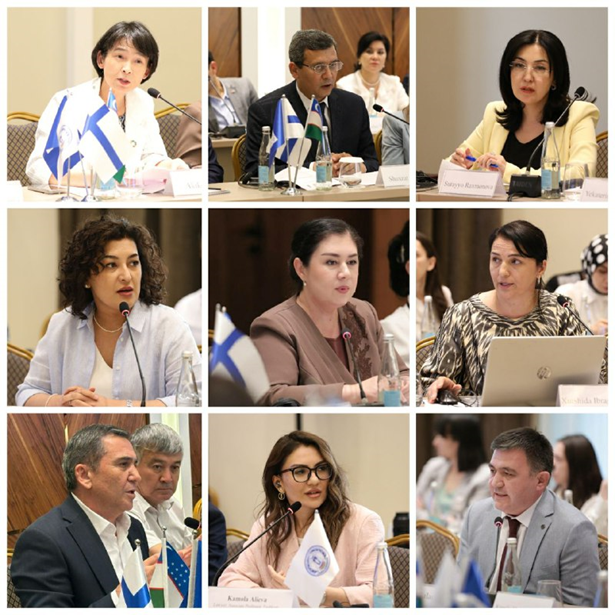
On 13 May 2025, a roundtable discussion titled “Improving Approaches to Raising Legal Awareness among the Population” was held in cooperation with the Commissioner of the Oliy Majlis for Human Rights (Ombudsman), the Ministry of Justice of the Republic of Uzbekistan, the United Nations Development Programme (UNDP) in Uzbekistan, and the Ministry for Foreign Affairs of Finland.
The event brought together members of parliament, representatives of government agencies and institutions, non-governmental non-profit organizations, human rights advocates, experts from the project “Strengthening Rule of Law and Human Rights Protection in Uzbekistan,” and staff of the Ombudsman’s Secretariat in both offline and online formats.
The main objective of the roundtable was to comprehensively examine the legal needs of the population, identify problematic areas, and develop practical recommendations for government bodies, non-governmental organizations, and other stakeholders operating in the field of legal aid provision.
It is worth noting that in recent years the Ombudsman has launched a number of practical initiatives aimed at raising public legal awareness. These include the “Ombudsman School” project in remote communities and the “Ombudsman Hour” lessons in schools across the country.
A distinctive feature of these initiatives is that they are not based on generic topics alone but are informed by the analysis of citizen appeals, enabling targeted legal education. Legal consultations are provided through face-to-face communication with the population involving relevant specialists and officials. Results show that the number of appeals has significantly decreased in regions where these initiatives were implemented, indicating that citizens are increasingly able to resolve their issues without formal complaints, due to greater legal understanding.
The event also highlighted the role of the Ombudsman’s regional representatives in increasing legal awareness, shared findings from studies on citizens’ legal needs, and presented work carried out to provide free legal assistance to victims of violence and human trafficking.
According to national survey results, over the past two years, the most common issues faced by citizens have been related to social protection, housing, financial stability, and employment. These challenges are directly linked to several constitutional rights — such as the right to social security, the right to own housing, the right to work under fair conditions, and guarantees of financial security.
Analyses show that low levels of legal literacy remain a key barrier to solving these issues legally, especially in remote and rural areas. There, limited awareness of legal rights significantly restricts individuals’ ability to access justice.
Raising legal consciousness among the population is not solely the responsibility of state institutions; it is a shared task that must involve civil society institutions, NGOs, and legal advocates. Empowering people to understand and exercise their rights through legal channels is a cornerstone of upholding human dignity.
Based on the discussions, priority directions were defined to improve legal literacy and strengthen public trust in legal institutions.
THE OMBUDSMAN PARTICIPATED IN THE CONFERENCE “IMPACT OF DIGITALIZATION AND ARTIFICIAL İNTELLIGENCE TO THE WORKPLACES” .
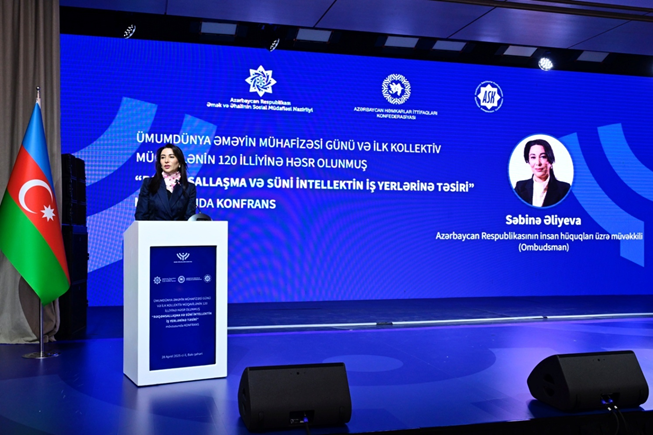
The Human Rights Commissioner, Sabina Aliyeva, participated in the conference “Impact of Digitalization and Artificial İntelligence to the Workplaces.”
While speaking at the conference, the Commissioner highlighted that notable steps have been taken in the country to advance digital governance and implement artificial intelligence. She emphasized the particular significance of the “AI Strategy of the Republic of Azerbaijan for 2025–2028,” which was approved by a Presidential Decree.
The Ombudsman noted that the given the increased AI usage, it is necessary to approach labor law and employment from new perspectives, the transition of the concept of AI is conditioned by ensuring human rights and freedoms and minimizing the negative impacts of technologies progress on human rights.
The Ombudsman noted the necessity of conducting trainings on new technologies for target groups and expand re-education opportunities, in collaboration with state bodies, civil society organizations, and the private sector.
The Ombudsman also noted that, within the scope of her powers, she will continue her activities in cooperation with relevant institutions on monitoring the impact of AI on human rights, investigating complaints, organizing awareness-raising activities, improving legislation, and analyzing the implementation process of state programs in this area.
“CRONYISM AND NEPOTISM IN HIRING TO BE PREEMPTIVELY PREVENTED!” ACRC CONDUCTED PROFESSIONAL EDUCATION ON FAIR RECRUITMENT.
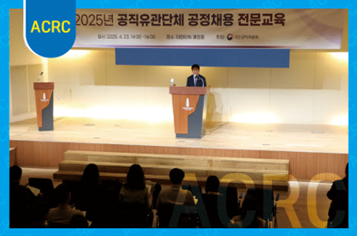
– The ACRC conducted professional education on fair recruitment for those in charge of recruitment and auditing at public service-related organizations in the metropolitan area… Providing guidance on the latest systems and considerations related to fair recruitment, etc.
The Anti-Corruption and Civil Rights Commission (ACRC, Chairperson Ryu Chul Whan) conducted professional education on fair recruitment (hereinafter referred to as professional education) in Ferrum Tower in Jung-gu, Seoul, today (April 23) for those in charge of recruitment and auditing at 150 public service-related organizations located in the metropolitan area to prevent corruption in the public sector.
This professional education consists of introduction of the latest laws and guidelines related to fair recruitment, such as the “Act on Fair Hiring Procedures”; considerations for each stage of recruitment, including recruitment planning, announcements, composition of review committees, and selection of successful candidates; measures for punishing related parties and redressing victims in the event of violations of fair recruitment; and case studies of major detected instances of recruitment fraud, etc.
Since 2023, the ACRC has been conducting professional education to prevent recruitment fraud in the public sector, and the number of participating organizations and graduates has been increasing every year.
※ (2023) 907 organizations, 5,066 people → (2024) 1,076 organizations, 7,772 people
In addition, 91.8% of education recipients who completed the education last year responded that the professional education was “helpful in performing duties,” indicating that this education is contributing in a practical way to on-site work performance.
The ACRC plans to gradually conduct education in the Gyeongsang, Jeolla, and Chungcheong regions, starting with this education, and complete professional education for a total of 1,490 public service-related organizations by the end of this year.
Lee Myung-soon, Vice Chairperson of the ACRC, emphasized, “In order for public institutions to conduct their hiring fairly, practical efforts made by those in charge at the front line as well as the improvement of the system are more important than anything else.“
He further stated, “The ACRC will continue to actively support frontline personnel in enhancing their professional recruitment work capacity in order to eradicate recruitment fraud in the future.”
MALAYSIAN DELEGATION VISITS PDHJ AS PART OF PREPARATIONS TO ESTABLISH OMBUDSMAN INSTITUTION.
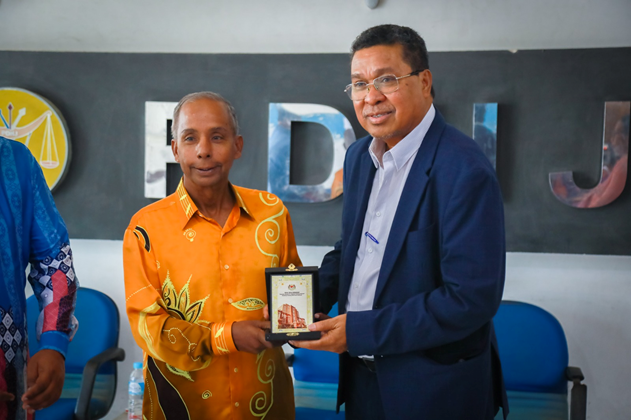
Dili, 28 May 2025 — The Provedoria dos Direitos Humanos e Justiça (PDHJ) hosted a high-level courtesy visit from a Malaysian government delegation, led by M. Kula Segaran, Deputy Minister in the Prime Minister’s Department (Law and Institutional Reform), as part of Malaysia’s initiative to learn from international models in preparation for the establishment of its own Ombudsman institution.
The delegation was accompanied by Dato’ Amarjit Sarjit Singh, Ambassador of Malaysia to Timor-Leste, who also participated in the meeting.
Representing PDHJ were Virgílio da Silva Guterres Lamukan, Ombudsman for Human Rights and Justice; Rigoberto Monteiro, Deputy Ombudsman for Good Governance; Maria Marília da Costa, Deputy Ombudsman for Human Rights; and other senior officials.
The visit provided an opportunity for the Malaysian delegation to learn about PDHJ’s institutional structure, mandate, and experiences over its 21-year journey. As a hybrid institution combining human rights protection with the promotion of good governance, PDHJ shared insights into its complaint handling mechanisms, oversight processes, and legal framework.
The Ombudsman, Virgílio Guterres, expressed his sincere appreciation to the delegation for including PDHJ in their official program and for their interest in learning from Timor-Leste’s experience. He noted that such exchanges strengthen regional cooperation and reinforce shared commitments to transparency and justice.
Discussions also explored areas of mutual interest, including whistleblower protection, maladministration prevention, and complaint management systems. The Malaysian delegation extended an invitation for PDHJ to participate in the upcoming Ombudsman Conference in Malaysia, which was positively received by the institution.
The meeting reflects growing regional collaboration and underscores PDHJ’s role as a reference point for institutions working to uphold integrity, accountability, and human rights.
